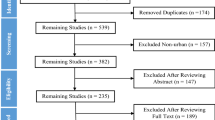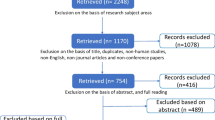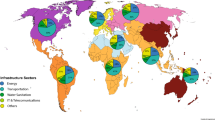Abstract
This paper considers health in cities from the perspective of complex adaptive systems. This approach has a number of important implications for intervention that do not emerge in traditional accounts of cities and health. The paper reviews various accounts of the nature of cities and of health as well as the traditional urban health and Healthy Cities movements. It then provides a framework for intervention and tests it against an actual case study. It concludes that a complex adaptive systems framework opens up fresh possibilities for improving health in urban contexts.
Similar content being viewed by others
Notes
This paper is based on research conducted by Health and Everything and the Canadian Urban Institute for Wellesley Central Health Corporation (WCHC). The consultants were asked to develop a framework that would guide an urban health initiative by WCHC in southeast Toronto. The research results were based partially on previous research conducted by WCHC1 , 2 and can be used by other organizations with a mandate to promote health in cities.
References
Hatton M. Building Bridges—The Community and Academic Worlds. Community-Based Research and the Wellesley Central Health Corporation. Toronto: Wellesley Central Health Corporation; 2002.
The Wellesley Hospital Urban Health Initiative: Urban Health Initiative Framework. Toronto: Wellesley Hospital Urban Health Initiative Committee; 1993.
Harpham T. Urban health research in developing countries: reflections on the last decade. In: Atkinson S, Songsore J, Werna E, eds. Urban Health Research in Developing Countries: Implications for Policy. Wallingford, UK: CAB International; 1996:1–10.
Fitzpatrick K, LaGory M. Unhealthy Places: The Ecology of Risk in the Urban Landscape. New York: Routledge; 2000.
Greer AL, Greer S, eds. Cities and Sickness: Health Care in Urban America. Beverly Hills, CA: Sage Publications; 1983.
Mathur B. Perspectives on Urban Health. Winnipeg, Manitoba: Institute of Urban Studies; 1991.
Schroeder SA. Urban health care: what works and why. J Urban Health: Bull NY Acad Med. 1998;75(2):349–355.
Tabibzadeh I, Rossi-Espagnet A, Maxwell R. Spotlight on the Cities: Improving Urban Health in Developing Countries. Geneva: World Health Organization; 1989.
Omenn GS. Health status and its determinants in urban populations. J Urban Health: Bull NY Acad Med. 1998;75(2):219–227.
Forreser JE. Gastro-intestinal infections. Clustering of Ascaris lumbricoides and Trichiuris trichiura infections within households. Trans R So Trop Med Hyg. 1988;82(2):2–288.
Brockerhoff M. Child Survival in Big Cities: Are the Poor Disadvantaged? New York: Population Council Research Division Working Papers; 1993.
Jain U. Effects of population density and resources on the feeling of crowding and personal space. J Soc Psychol. 1992;126:331–338.
Landon M. Intra-Urban Health Differentials in London. London: London School of Hygiene and Tropical Medicine; 1994.
Benneh G, Songsore J, Nabila JS, et al. Environmental Problems and the Urban Household in the Greater Accra Metropolitan Area (GAMA)—Ghana. Stockholm: Stockholm Environment Institute; 1993.
Stephens C. Research on urban environmental health. In: Atkinson S, Songsore J, Werna E, eds. Urban Health Research in Developing Countries. Wallingford, UK: CAB International; 1996:115–134.
Atkinson SJ, Cheyne J. Immunization in Urban Areas: issues and strategies. Bulletin of the World Health Organization. 1994;72(2):183–194.
Davies JK, Kelly MP, eds. Healthy Cities: Research and Practice. London: Routledge; 1993.
Rupp G. Toward healthy cities: opportunities for collaboration. J Urban Health: Bull NY Acad Med. 1998;75(2):401–406.
A Strategy for Developing Healthy City Indicators. Toronto: City of Toronto; 1994:101.
Duhl LJ. An ecohistory of health: the role of ‘healthy cities.’ Am J Health Promot. 1996;10(4):258–261.
Hancock T. Healthy Cities: the Canadian project. Health Promot. 1987;26(1):2–4.
Hancock T, Duhl L. Promoting Health in the Urban Context. Copenhagen, Denmark: FADL Publishers; 1988.
Kenzer M. Healthy Cities: a guide to the literature. Public Health Rep. 2000;115(2–3):279–289.
Hancock T. The healthy city from concept to application: implications for research. In: Davies JK, Kelly MP, eds. Healthy Cities: Research and Practice. London: Routledge; 1993:14–24.
Forester J. The Deliberative Practitioner. Boston: MIT; 2001.
Glouberman S. A Dynamic Concept of Health. In: Glouberman S, ed. Towards a New Concept of Health: Three Discussion Papers. Ottawa: Canadian Policy Research Networks; 2000.
Zimmerman B, Lindberg C, Plsek P. Edgeware: Insights from Complexity Science or Health Care Leaders. Irving Texas: VHA, Inc; 1998.
Waldrop M. Complexity: The Emerging Science at the Edge of Order and Chaos. New York: Touchstone; 1992.
Prigogine I. The End of Certainty. New York: Free Press; 1997.
Kaufman S. At Home in the Universe: The Search for the Laws of Self-Organization and Complexity. New York: Oxford University Press, 1995.
Glouberman S, Zimmerman B. Complicated and Complex Systems: What Would Successful Reform of Medicare Look Like? Toronto: Commission on the Future of Health Care in Canada; 2002.
Weber M. The Nature of the City. In: Sennett R, ed. Classic Essays on the Culture of Cities. New York: Meredith Corporation; 1969.
Waley D. The Italian City-Republics. New York: McGraw-Hill Book Company; 1969.
Howard E. Garden Cities of To-Morrow. London: Faber and Faber; 1902/1946.
Mumford L. The City in History: Its Origins, Its Transformations and Its Prospects. New York: Harcourt, Brace & World, Inc.; 1961.
Simmel G. The Metropolis and Mental Life. In: Sennett R, ed. Classic Essays on the Culture of Cities. New York: Meredith Corporation; 1969.
Scott JC. Seeing Like a State: How Certain Schemes to Improve the Human Condition Have Failed. New Haven: Yale University Press; 1998.
Jacobs J. The Death and Life of Great American Cities. New York: Random House; 1961.
Scott JC. Seeing Like a State: How Certain Schemes to Improve the Human Condition Have Failed. New Haven: Yale University Press; 1998.
Jacobs J. Dark Age Ahead. New York: Random House; 2004.
Glouberman S. Towards a New Perspective on Health Policy. Ottawa: Canadian Policy Research Networks; 2001.
Singer C, Underwood E. A Short History of Medicine. Oxford: Clarendon Press; 1962.
Mclachlan G, McKeown T, eds. Medical History Medical Care. London: Oxford University Press; 1971.
Coleman V. The Story of Medicine. London: Robert Hale Ltd.; 1985.
Goerke LS, Stebbins EL. Mustard's Introduction to Public Health. 5th ed. Toronto: The Macmillan Company; 1968.
Wilkinson RG. Unhealthy Societies: The Afflictions of Inequality. London: Routledge; 1996.
Parsons T. Illness and the role of the physician: a sociological perspective. Am J Orthopsychiatr. 1951;21:452–460.
Antonovsky A. Health, Stress, and Coping. 1st ed. San Francisco, CA: Jossey-Bass Publishers; 1979.
Kisilevsky S, Groff P, Nicholson C. The health gradient challenge: a new approach to health inequalities. In: Glouberman S, ed. Towards a New Concept of Health: Three Discussion Papers. Ottawa: Canadian Policy Research Networks; 2000:13–24.
Baker N, ed. Building a Relational Society. Hants: Arena; 1996.
Marmot MG, Bosma H, Heminway H, Brunner E, Stansfeld S. Contribution of job control and other risk factors to social variations in coronary heart disease incidence. Lancet. 1997;350:235–239.
Duffin J. History of Medicine: A Scandalously Short Introduction. Toronto: University of Toronto Press; 1999.
Lalonde M. A New Perspective on the Health of Canadians: A Working Document. 1981 ed. Ottawa: Minister of Supply and Services Canada; 1974.
Wilkinson R, Marmot M, eds. Social Determinants of Health: The Solid Facts. Copenhagen: WHO; 2003.
Raphael D, ed. Social Determinants of Health: Canadian Perspectives. Toronto: CSPI; 2004.
Anderson NB, Armstead CA. Toward understanding the association of socioeconomic status and health: a new challenge for the biopsychosocial approach. Psychosom Med. 1995;57:213–225.
De Greene KB, ed. A Systems-Based Approach To Policymaking. Boston: Kluwer Academic Publishers; 1993.
Lomas J. Improving Research Dissemination and Uptake in the Health Sector: Beyond the Sound of One Hand Clapping. Hamilton: Centre for Health Economics and Policy Analysis; 1997.
Mooney J. Onward Industry! The Principles of Organization. New York: Harper and Row; 1947.
Lasswell HD. The Decision Process: Seven Categories of Functional Analysis. College Park: University of Maryland; 1956.
Axelrod R, Cohen MD. Harnessing Complexity: Organizational Implications of a Scientific Frontier. New York: The Free Press; 1999.
Cooperrider DL, Srivastva S. Appreciative inquiry in organizational life. In: Woodman R, Pasmore W, eds. Research in Organizational Change and Development. Greenwich, CT: JAI Press; 1987:129–169.
Clairmont D, Magill DW. Africville: The Life and Death of a Canadian Community. 3rd ed. Toronto: McClelland and Stewart; 1999.
Hancock T. The evolution, impact and significance of the Healthy Cities/Healthy Communities movement. J Public Health Policy. 1993;14(1):5–18.
Acknowledgments
This research was supported by Wellesley Central Health Corporation, Bridgepoint Health, and Change Foundation.
Author information
Authors and Affiliations
Corresponding author
Additional information
Glouberman, Gemar, Armstrong, Newman, and Siotis are with the Kunin-Lunenfeld Applied Research Unit, Baycrest Centre for Geriatric Care, Toronto, Ontario, Canada; Campsie and Miller are with the Canadian Urban Institute, Toronto, Ontario, Canada; Groff is with the SMARTRISK Foundation, Toronto, Ontario, Canada.
Rights and permissions
About this article
Cite this article
Glouberman, S., Gemar, M., Campsie, P. et al. A Framework for Improving Health in Cities: A Discussion Paper. JURH 83, 325–338 (2006). https://doi.org/10.1007/s11524-006-9034-9
Published:
Issue Date:
DOI: https://doi.org/10.1007/s11524-006-9034-9




